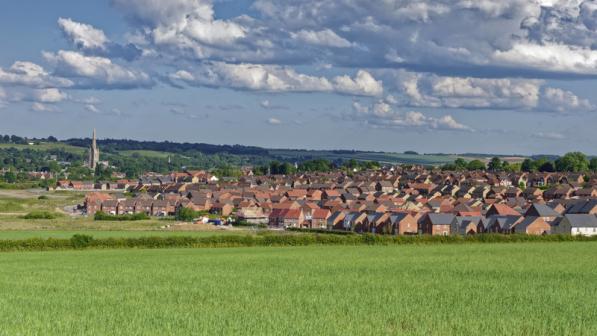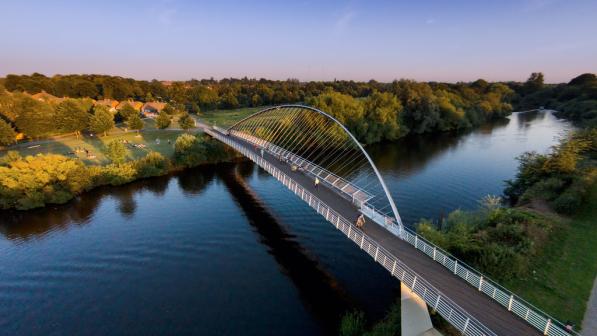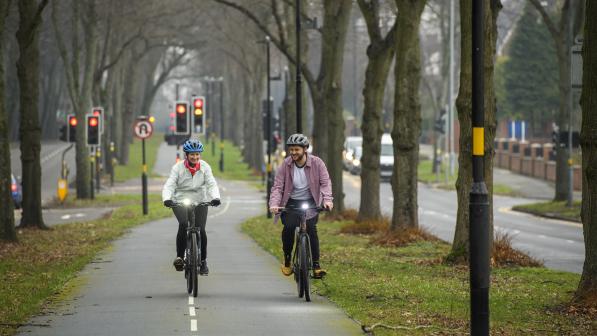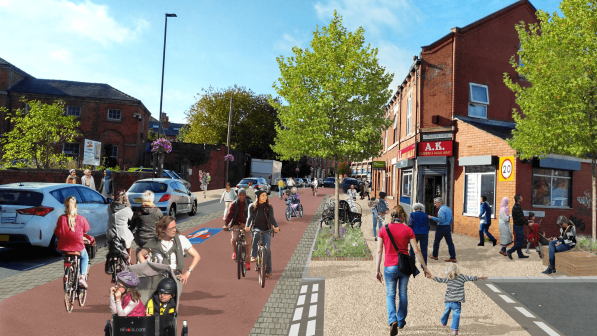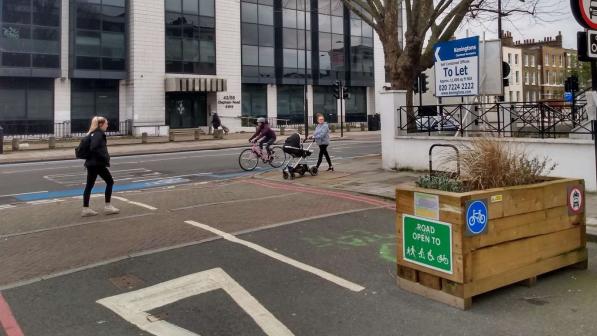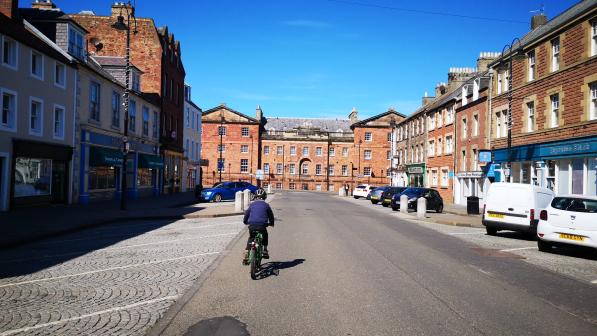Why we are standing up for 15-minute cities and 20-minute neighbourhoods

Sometime in the coming days (late February or early March 2023), the House of Lords will debate several amendments to the Government’s Levelling Up and Regeneration Bill which have been drafted by Cycling UK and our close allies in the Walking and Cycling Alliance and the Better Planning Coalition.
I have previously outlined our amendment. It would require local walking, cycling or rights of way network plans drawn up by local transport or highway authorities in England to be incorporated into the relevant local planning authorities’ development plan.
This would help protect land (such as disused railway lines) that could form useful walking or cycling routes from being built over by new housing or other developments, while also ensuring that these developments are well connected to local walking, cycling or rights of way networks. It would also secure funding from those developers to improve or introduce walking or cycling routes.
The amendment has been taken up by the Walking and Cycling Alliance and supported by the Better Planning Coalition. It has also been tabled by a really strong cross-party line-up of Peers – I’ll come back to that.
Meanwhile the Better Planning Coalition – a much wider grouping that also includes most of the members of the Walking and Cycling Alliance – has tabled more than 20 amendments, aimed at creating “a planning system fit for the climate, nature and people”. It has drafted several amendments to ensure that the planning system plays its role in averting climate-related damage.
From Cycling UK’s perspective, it is vital to reverse the tide of new developments built in greenfield locations with terrible public transport access, which would make us ever more car dependent.
Other BPC amendments focus on protecting and enhancing nature and improving access to nature – particularly in England’s national parks.
Supporting 20-minute neighbourhoods for our health and wellbeing
We can expect a lively debate on the proposal from the BPC’s health and wellbeing group, namely that planning policies should incorporate the principle of 20-minute neighbourhoods.
The 20-minute neighbourhood principle is a very simple and appealing idea. Towns and cities should be planned so that key facilities – such as food shops, schools, public transport and health-care facilities – can be reached within a short walk or cycle ride of people’s homes. The location of new housing and other developments also needs to reflect this principle.
This is simply how communities have developed for centuries, prior to the arrival of mass car ownership. Unfortunately, though, when you start designing in at least one car-parking space for every household, it reduces how many homes you can provide per square km.
Not only does that frustrate efforts to deliver the homes (and particularly the affordable homes) that people need, but it also increases the distance that people have to travel to reach those food shops, schools, public transport and health-care facilities. It also crowds out green open space, for children to play or simply for nature to grow.
Yet somehow a bizarre conspiracy theory is circulating in the public domain. It has been spread by people who also argued that Covid lockdown rules and the climate change conspiracy are in fact attempts by the global elite to subject us to increasing control and surveillance.
According to this conspiracy theory, 20-minute neighbourhoods and the related concept of 15-minute cities aren't about enabling you to get around on foot or by bike to the local schools, shops and healthcare facilities; no no, they are actually a dastardly communist plot to imprison people in their ghettos.
You won't be allowed out of your 15-minute bubble, and you’ll be subjected to constant surveillance by Big Brother to prevent you from doing so. Yes, really!
The Guardian has produced an excellent critique of this nonsense, while an article published by Open Democracy presents evidence suggesting that some of the people spreading these myths are ‘scam artists’.
Busting myths: the dilemma
Yet the fact that these conspiracies get coverage at all creates a real dilemma for organisations like Cycling UK. It is tempting to ignore them, to avoid giving them the oxygen of publicity, knowing that sooner or later they will go away.
After all, there is a lot of psychological research which says that, if you try to bust a myth, you are actually likely to reinforce the perception that the myth may have some truth to it.
Yet the counter-argument is that, if left uncontested, myths like this can spread like wildfire. As the saying goes: “A lie can travel half way round the world before the truth has got its boots on.”
Laughable as this myth might be, we have to be concerned that a segment of public opinion will instinctively believe it. The question is how to prevent it spreading.
The tactic used by those spreading these myths is to attract attention by making outrageous arguments as loudly as they can. The hullabaloo they whip up helps convince their own supporters that they are a majority, however clearly the opinion polls might say the opposite.
Meanwhile the real majority who support safer streets get bludgeoned into thinking that they are in the minority – and that they had better keep quiet if they don’t want to become social outcasts.
Hence there is a real risk that politicians may take fright, mistaking a noisy fringe for ‘public opinion’, when it is nothing more than the shrill voices of a noisy minority. That’s probably what prompted Kensington and Chelsea, West Sussex and now Bournemouth, Christchurch and Poole councils to rip out temporary cycle facilities, despite them being well used, due to a perception that they were ‘unpopular’.
Cycling UK’s own research showed that a significant majority supported these measures, yet people were overestimating the level of public opposition by around 50%.
The same thing happened about 20 years ago with speed cameras and 20mph speed limits. Public support for both of these measures has always been around 70-75% – yet you wouldn’t believe it from reading the newspapers at that time.
Help ensure your local politicians aren’t fooled
The risk is that politicians fall for the myth that there is massive public opposition to measures like Low Traffic Neighbourhoods, and now to 20-minute neighbourhoods or 15-minute cities.
It falls to organisations like Cycling UK to face up to this manipulation of public opinion, to call it out for what it is, and reassure politicians that this opposition comes from a noisy minority, who do not represent public opinion.
The Better Planning Coalition’s health and wellbeing amendment, calling for (among other things) developments to incorporate the 20-minute neighbourhood principle, has some admirably experienced Peers supporting it. It has been tabled by Lord Young of Cookham - formerly Sir George Young, a pro-cycling former Conservative Transport Secretary, who is known as ‘the bicycling baronet’.
The other Peers who have added their signatures on the amendment paper (amendments can only have a maximum of four signatories) include Labour Peer Lord Hunt of Kings Heath (formerly President of the Royal Society for Public Health), LibDem Peer Lord Foster of Bath and Lord Stevens of Birmingham, aka Sir Simon Stevens, who was until recently the CEO of the NHS.
We thank them for their support, likewise to Lord Berkeley (Labour) and Baroness Randerson (LibDem), who joined Lord Young and Lord Hunt in supporting our walking, cycling and rights of way networks amendment.
For more information about these and other amendments to the Levelling Up and Regeneration Bill (LURB) that we are supporting, see the Walking and Cycling Alliance’s briefing for the Lords Committee Stage (available to download below).
I am confident that our noble backers are wise and experienced enough to remain steadfast in their support for 20-minute neighbourhoods. They aren’t likely to have their heads turned by bizarre conspiracy theories.
But we also to make sure this same message reaches other MPs and councillors all around the UK. That’s where our local Cycle Advocacy Network (CAN) volunteers come in.
If you are interested in making sure that new developments in your area support cycling and don’t perpetuate car dependence, or in improving local cycling conditions more generally, do please consider joining CAN. You can sign up here.
